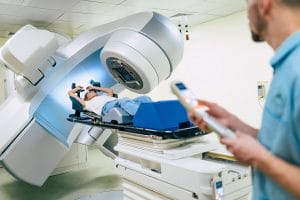The Radiation Treatment Used to Cure You May Kill You
 When they hear the words medical malpractice, most people think of an immediately apparent injury or death that was caused by a doctor treating an injury or illness. Maybe there was a surgical error or the wrong medication was prescribed that caused the injuries. But what about latent harm that you never knew could happen?
When they hear the words medical malpractice, most people think of an immediately apparent injury or death that was caused by a doctor treating an injury or illness. Maybe there was a surgical error or the wrong medication was prescribed that caused the injuries. But what about latent harm that you never knew could happen?
Radiation therapy is just one form of treatment cancer patients may receive after they have had surgery to remove cancerous cells. While it’s ironic that radiation can save lives, it can also be at the root of a medical mistake that claims lives years down the road – a mistake that can lead to a wrongful death claim.
What is radiation therapy?
Radiation therapy uses high doses of radiation to kill cancer cells:
Radiation therapy (also called radiotherapy) is a cancer treatment that uses high doses of radiation to kill cancer cells and shrink tumors. […]
At high doses, radiation therapy kills cancer cells or slows their growth by damaging their DNA. Cancer cells whose DNA is damaged beyond repair stop dividing or die. When the damaged cells die, they are broken down and removed by the body. Radiation therapy does not kill cancer cells right away. It takes days or weeks of treatment before DNA is damaged enough for cancer cells to die. Then, cancer cells keep dying for weeks or months after radiation therapy ends.
One thing to note is that you can only receive so much radiation over the course of your lifetime. (Cancer.gov calls this the “lifetime does limits.”) What this means is, if your cancer comes back – or if you develop a new one later in life – you may not be able to undergo radiation therapy again if you already reached your limit during the initial rounds of treatment.
Why informed consent is important for any medical procedure
One way to commit a medical mistake is by a doctor failing to disclose the risks of treatment or a procedure. Even when the physician knows you will proceed because the short-term alternative is too devastating, you still have a right to know what you’re up against and to choose the right path for yourself. If nobody explained the risks to you, it deprived you of making that choice, and many others after the fact. Knowledge is power that, in this instance, might offer you the chance to protect your life. When you are unaware of the potential future repercussions, it can be easy to miss important warning signs of a medical emergency until it’s too late.
Knowing that radiation treatments could cause a recurrence of cancer down the road could absolutely change how you live your life. Instead of operating under the belief that your cancer is in the rearview mirror and that you never have to worry about it again, you can make a plan to catch it early in the event it comes back.
Knowing that possibility exists, no matter how remote, gives you more control over the outcome by:
- Having blood work and other tests performed periodically
- Remaining more vigilant about random medical issues that suddenly appear
- Being attentive to factors that could potentially trigger a recurrence
- Educating yourself on what you can do to minimize your risk
Based on your cancer history, you may also choose to go directly to specialist for a diagnosis to save time when your primary care physician can’t immediately pinpoint and cure an ailment. For example, someone who suffered cancer located in the head and neck region who now has random discomfort near that general area, may want to make an appointment with an oncologist. Just the fact that you have a mysterious pain or even infection near the former site treated with radiation should be enough to signal a warning bell for any general practitioner familiar with your history.
How do I know if I have a claim for medical malpractice?
In order to file a medical malpractice claim, you must be able to show four things:
- That a patient/doctor relationship existed, so you were owed a duty of care.
- That the doctor was negligent in his or her actions.
- That this negligence led to your injuries.
- That you sustained damages (AKA, losses) related to your injuries.
So if your doctor misdiagnosed you with cancer, or failed to warn you about the risks of radiation, and you suffered injuries and losses as a result, you could have a claim for medical malpractice.
Can you sue for malpractice if your cancer comes back after treatment?
While these recurrent cancers often develop within several years of a person’s radiation treatment, and the odds of developing a new cancer slowly decline the further out you get, it’s still not a guarantee that you’ll be possible over the following years. Doctors deal with statistical data because that’s all they are able to rely on, which means anomalies can and will happen.
In other words, no – you can’t sue because cancer comes back. But you may be able to seek damages if your doctor failed to warn you that your treatment may causes an increased risk later in life.
According to Cancer Treatment Centers of America, “the risk remains that radiation therapy to treat cancers in young people may increase their chance of developing second cancers later in life.” Some doctors at various medical institutions failed to mention this risk to patients in their late 40s who they believed would never live long enough to see a recurrence of cancer. Some of those individuals have been blindsided decades later by learning the radiation therapy that saved their life almost took it when their cancer returned with complications. Others weren’t so lucky.
If you or someone you care about was the victim of medical malpractice, Gainsberg Injury and Accident Lawyers wants to help. Our Chicago medical malpractice attorneys can review your medical records and history, and help you make a claim for damages. To schedule a free consultation, please call 312-600-9585 or fill out our contact form today.

Attorney Neal Gainsberg has spent the last 20+ years fighting to protect the rights of the injured in Chicago and throughout Illinois. For dedicated legal help with a personal injury, car accident, or wrongful death matter, contact Gainsberg Injury and Accident Lawyers in Chicago for a free consultation.
